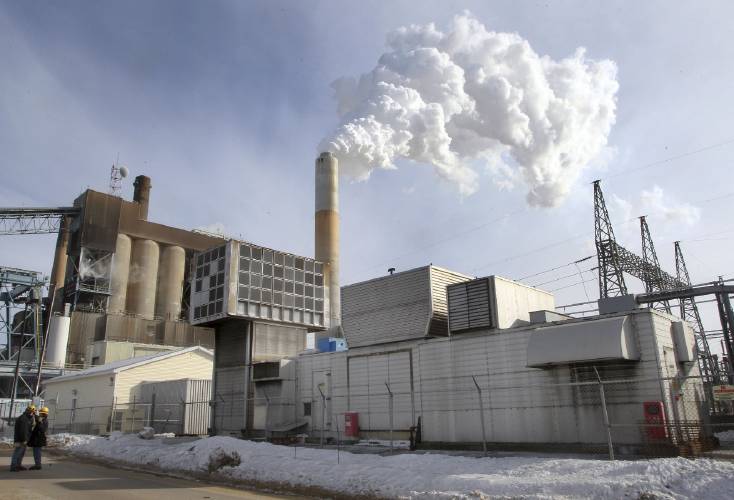State gives hard pollution deadline to Bow power plant

FILE - A Jan. 23, 2014, photo of the Merrimack Station in Bow. Jim Cole/AP
|
Published: 02-16-2024 1:06 PM
Modified: 02-16-2024 3:03 PM |
Almost a year after it failed a required emissions test and after a few unsuccessful attempts to complete the process, the Merrimack Station power plant in Bow has received a hard deadline from the state to meet air pollution guidelines.
“There were three or four attempts to complete the test. We thought at this point issuing the order makes sense to put a time frame on it,” said Craig Wright, Air Resources division director for the Department of Environmental Services, concerning an administrative order filed Feb. 7 by Commissioner Robert Scott.
The order says Granite Shore Power, the investor group that owns New England’s last coal-fired power plant, must run what is known as a compliance stack test by March 23. By mid-May it must submit official results showing that emissions of sulfur, particulates and other regulated substances were below levels required under the plant’s operating permit.
It’s not clear what would happen if the company failed to meet the timelines. “We would deal with it as it happens,” said Wright.
Granite Shore Power has the option of appealing the order to the state Air Resources Council, a separate regulatory body. In a response filed Feb. 14, the company said it “disputes the findings” of the order and “takes issue with the unreasonable relief and deadlines” but planned to follow the schedule.
“GSP is committed to conducting a representative performance test,” the response concludes.
The company’s response discusses “abnormal operating conditions” that led to the initial failure on Feb. 27, 2023, and details efforts made since then to meet air pollution standards. They include replacing the system that removes sulfur from flue gases and working on systems that grab soot and other particles electrostatically as they are emitted from the furnaces and boilers.
The group No Coal No Gas, which has urged the shutdown of Merrimack Station, claimed the poor condition of equipment in the power plant makes it difficult to continue operations. The older of the two units generates 114 megawatts of electricity and was built in 1960. The second unit, which can produce 346 megawatts, came online in 1968.
Article continues after...
Yesterday's Most Read Articles
 Reclaiming Healy Park: A symbol of renewal and a reckoning with homelessness in Concord
Reclaiming Healy Park: A symbol of renewal and a reckoning with homelessness in Concord
 Home buying gets tougher as prices in New Hampshire continue to rise, outpacing national increase
Home buying gets tougher as prices in New Hampshire continue to rise, outpacing national increase
 Boutwell’s is now the biggest candlepin center in the state
Boutwell’s is now the biggest candlepin center in the state
 Suspect in Hampton Beach shooting arrested in Deerfield following police pursuit and shelter-in-place order
Suspect in Hampton Beach shooting arrested in Deerfield following police pursuit and shelter-in-place order
 Pedestrian struck in Pittsfield, officials treat death as suspicious
Pedestrian struck in Pittsfield, officials treat death as suspicious
 Concord school leaders grapple with lunch debt exceeding $100,000
Concord school leaders grapple with lunch debt exceeding $100,000
Merrimack Station is obligated to remain in operation through at least 2025 because it won bids in the annual capacity auction run by ISO-New England, which operates the six-state power grid. Those bids are a guarantee that the plant could produce a certain amount of on-demand electricity during high-stress periods such as hot summer afternoons or winter cold snaps; if it fails to generate that electricity the owners could face hefty fines.
Like most coal-fired plants, Merrimack Station was built to generate electricity almost continuously, operating as what is known as a baseload plant. But gas-fired electricity and electricity from solar and wind turbines is now cheaper – often much cheaper – than electricity from coal plants. As a result, Merrimack Station now operates as a peaker plant, producing power only during periods of peak demand when the per-kilowatt price is high enough to cover operating costs. In the past year, for example, the two units have operated slightly over 500 hours, or only about 21 days.
Granite Shore Power also owns two smaller, kerosene-fired turbines at the power station that are relatively small, totaling 35 megawatts in output, but are valuable because they can be turned on and off very quickly to help stabilize the grid.







 Granite Geek: The circle of life is painful when watching the species-gets-killed part
Granite Geek: The circle of life is painful when watching the species-gets-killed part Concord’s two Rite Aid stores shutting soon
Concord’s two Rite Aid stores shutting soon
